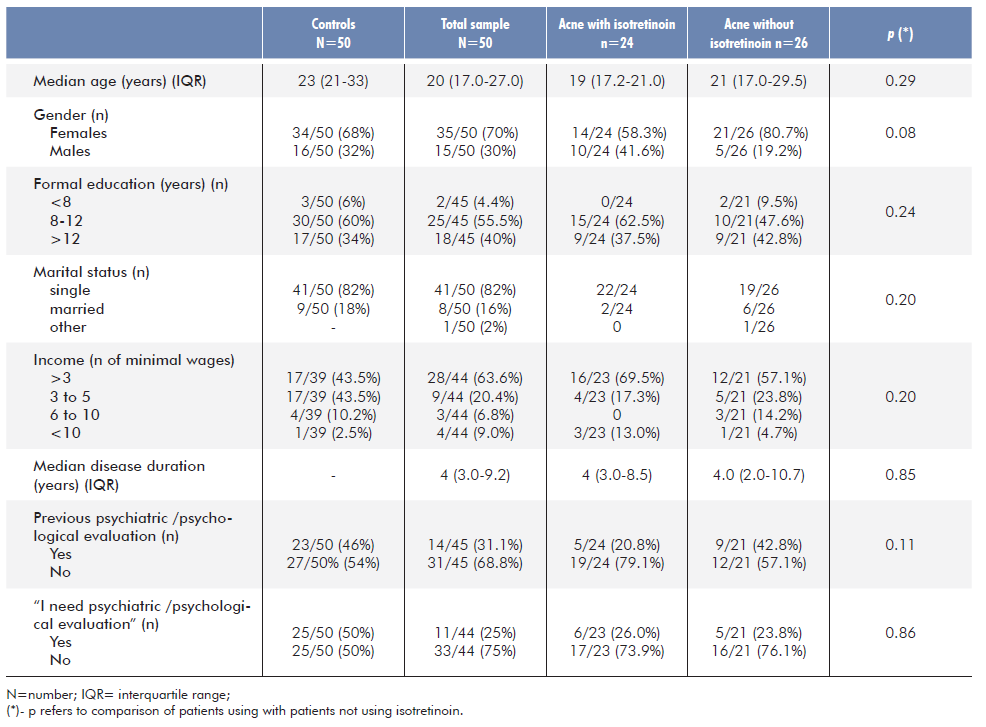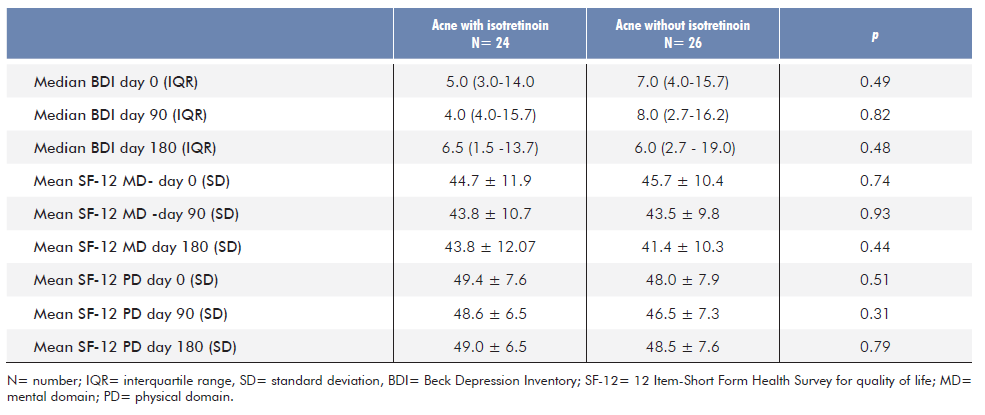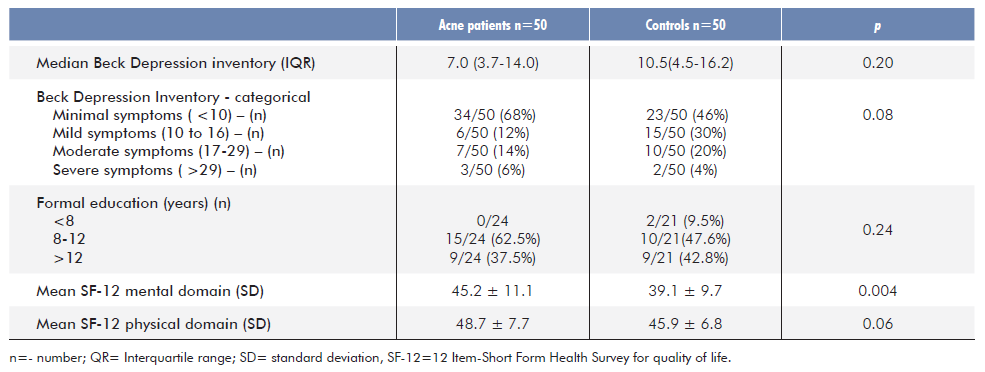INTRODUCTION
Acne vulgaris is a chronic inflammatory disease that affects the pilosebaceous unit. It results from androgen-induced augmen-ted sebum production (seborrhoea), follicular hyper keratinization, bacterial colonization (mainly by Cutibacterium acnes) and local inflammation.1It is more common in the face, neck, chest, and back, affects 80% of teenagers2 and leads to facial scarring in up to 20% of them.1 This may cause distortion of body self-image bringing negative effects on self-esteem.1
Acne has been connected with isolation, troubles in interpersonal relationships, depression and even with suicidal behavior.3 A study in New Zealand on 9567 young individuals has shown that 39.9% of those with self-rated severe acne reported suicidal ideation and 12.9% tried suicide.4
One of the mainstay treatments of moderate to severe acne is oral isotretinoin,5 a synthetic oral retinoid. Among other side effects, this drug has been associated with psychiatric problems such as depression, psychotic behavior and suicidality. Similarly, experimental studies with animal models pointed out that isotretinoin may be associated with a depressive like behavior.6
However, clinical studies in humans have shown conflicting results. While Vallerand et al7 in their systematic review of 11 trials showed that this medication increases the frequency of psychiatric adverse events, Huang et al8 in a meta-analysis including 31 studies observed that isotretinoin could improve depressive signs.
Another meta-analysis by Li et al9 observed that the risk of depres-sion was seen in retrospective studies but that it did not appear in prospective studies and their overall results suggested that isotretinoin improved depression in patients with acne.
Using a drug that may cause depression in a disease that, by itself, is associated with depression could further worsen the problem. So, it is very important to clarify the role of isotretinoin in this context.
Herein we studied a sample of patients with acne using isotretinoin to see the risk of depression and quality of life comparing them with acne patients without this treatment and control subjects.
METHODS
This is a prospective study approved by local Committee of Ethics in Research (approved by the Committee of Ethics in Research from Evangelic Mackenzie School of Medicine under protocol number 98305418.0.0000.0103 from September 18th, 2020). All participants signed an informed consent. We included 100 individuals: 50 with acne (24/50 or 48% using isotretinoin and 26/50 or 52% without this treatment) and 50 age and gender matched individuals as a comparison group. All included patients were from a single Dermatology Center and had moderate or severe acne diagnosed by a dermatologist.
All acne patients receiving isotretinoin had grade III or grade IV acne and isotretinoin was used at a daily dose 1-2 mg/kg/day according to guidelines from the local dermatology service12 and did not suffer any influence from the authors. Other acne patients, with acne grade III or IV were treated according the local protocol with topical retinoids, topical antibiotics and systemic antibiotics as appropriate and in according with patients characteristics.12 Controls were healthy individuals from family of patients with acne and other individuals without acne.
This is a convenience sample that included all acne patients that came for regular consultations from November 2018 to September 2019 and that agreed to participate in the study.
Epidemiological data (age, gender, auto-declared ethnic background, duration of acne, marital status, income and years of formal education) were obtained from the charts or upon direct questioning.
Patients and controls answered a questionnaire that included fa-milial history of depression, previous history of psychiatric/psycholo-gical consultation and a question on if they believed that they need a psychiatric or psychological evaluation. They also answered the Beck Depression Inventory (10) and 12-Item-Short Form Health Survey for quality of life (SF-12) (11). The Beck Depression Inventory is a 21-item self-reporting questionnaire for evaluating the severity of depression in normal and psychiatric populations. For each question answers are rated between 0 and 3. According to the sum of points in the 21 questions, depression symptoms can be classified as mi-nimal (0-9), light (10-16), moderated (17-29) and severe (30-63).10
The SF-12 is a questionnaire with 12 items that evaluates the physical and mental domains of quality of life that goes from 0 to 100; high values are associated with better quality of life.11
All patients and controls answered the Beck depression inventory and SF-12 on day 0. Acne patients (using isotretinoin or not) also answered the same instruments on day 90 (3 months after isotretinoin treatment) and on day 180 (6 months after isotretinoin treatment).
Acne patients and controls were compared at day 0. Acne patients using isotretinoin or not were compared at days 0, 90 and 180. We also compared data on acne patients obtained at day 0 with those obtained at day 90 and day 180.
Frequency and contingency tables were used to collect data. Data distribution was judged by Shapiro Wilk’s test. Comparison of nominal data was done using Fischer and chi-squared tests. To compare numeric data of controls and acne patients and acne patients with and without isotretinoin we used unpaired t tests and Mann Whitney. To compare results of Beck and SF-12 questionnaire in days 0, 90 and 180 of acne patients we used the ANOVA or the Friedman tests. To compare Beck and SF-12 questionnaire at days 0 and 180 paired t test and Wilcoxon tests were used. The adopted significance was 5%.
RESULTS
We studied 50 acne patients (35 females/15 males) with median age of 20 years (IQR = 17 to 27 years) suffering from the disease for a median of 4 years (IQR = 3.0 -9.2), of whom 24 (14 females/10 males) with median age of 19.0 (IQR = 17.0 to 21.0) were under treatment with isotretinoin and had a median disease duration of 4 years (IQR= 3.0 to 8.5) (Table 1). As controls we included 50 healthy individuals without acne (35 females and 15 males) with a median age of 23.0 years (IQR=21.0 to 33.0). More than 90% patients in both groups of acne patients, as well and the control group had more than 8 years education and previous history of psychiatric evaluation or self-perceived need for it was respectively 31.1% and 25% for acne patients vs 46% and 50% for controls (Table 1). The self-perceived need for psychiatric evaluation but not the previous history of psychiatric evaluation was higher in controls than acne patients with p=0.01 and 0.13 respectively.
Table 1 Description of studied sample and comparison of acne patients with and without treatment with isotretinoin.

The comparison of socio-demographic data in acne patients using and not using isotretinoin was similar and therefore should not interfere in the results of the instruments used to measure quality of life and depression.
2. Comparison of SF-12 and Beck inventory between acne patients at day 0 and controls:
Comparing of Beck DI between acne/non-acne patients at Day 0, acne patients had similar scores in this instrument as controls (median value of 7.0 with IQR = 3.7 to 14.0 vs median of 10.5 with IQR = 4.5 to 16.2). When the Beck inventory was studied in categories more controls showed mild and moderate depressive symptoms (30% and 20% respectively) than acne patients (12% and 14% respectively) although this difference was not statistically significant (Table 2). Table 2 also shows that the mental domain of SF-12 instrument for quality of life was worse in controls than in acne patients without treatment (mean values of 39.1±9.7 in controls vs 45.2±11.1 in acne patients). No differences could be shown in the SF-12 physical domain.
3. Comparison of Beck depression inventory and SF-12 results between acne patients treated and not treated with isotretinoin
Acne patients were followed for a total of 180 days. The treatment was well tolerated with all included patients used the medications during the whole observation period (no dropouts).
The comparison of the results in the Beck depression inventory and of SF-12 (mental and physical domains) between the two acne groups (with and without isotretinoin) at days 0, 90 e 180 is presented on Table 3. Using the Beck inventory there was no significant difference between groups at baseline (median value of 5.0 with IQR = 3.0 to 14.0 in the treatment group vs median value of 7.0 with IQR = 4.0 to 15.7 in patients not treated with isotretinoin), at 3 months (median values of 4.0 with IQR=4.0 to 15.7 vs 8.0 with IQR 2.7 to 16.2 ) and at 6 months of treatment (median value of 6.5 with IQR = 1.5 to 13.7 vs 6.0 with IQR= 2.7 to 19.0).
Table 3 Comparison of Beck Depression Inventory and 12 Item- Short Form Health Survey for quality of life between acne patients with and without isotretinoin.

The comparison of Beck Depression Inventory at baseline, days 90 and 180 in those using isotretinoin showed p=0.72; the comparison of SF-12 mental domain showed p=0.86 and of SF-12 physical domain, p=0.85.
The same has happened with control: the comparison of Beck Depression Inventory in days 0, 90 e 180 in those not using isotretinoin showed p=0.86; the comparison of SF-12 mental domain showed p= 0.08 and of SF-12 physical domain, p=0.34.
When the results of Beck inventory in day 0 were compared to results at day 180 in acne patients using isotretinoin, no differences were found (p=0.79), as observed in acne patients not using isotretinoin (p= 0.97).
The comparison of SF-12 mental domain in day 0 and 180 in acne patients treated with isotretinoin showed p= 0.68 and in those not treated p=0.71. Likewise, the comparison of SF-12 physical domain in day 0 and 180 in acne patients treated with isotretinoin showed p=0.82 and in the group not treated p=0.10.
These results demonstrated that no changes in the mental or physical quality of life neither in the depression scores of Beck inventory were noted with the duration of the isotretinoin treatment.
DISCUSSION
The present results point out that patients, even with moderate to severe acne, have mostly a minor effect on the depression with 16/50 (32%) of them scoring more than 10 at Beck inventory. Moreover, no differences were found in the depression indicators between the acne group and controls, with controls having a worse performance of SF-12 mental domain and recognizing to need psychiatric/psychological monitoring than acne patients. This data is in disagreement with previous results and this may have been caused by differences in social and cultural aspects. Valorization of body-image, presence of alternative forms to improve self-esteem and social acceptance may differ according to the studied society.
We also did not find differences in patients treated and not treated with isotretinoin (this is only important to see if it changes after isotretinoin, not at the onset of treatment). Clarifying if isotretinoin is or not causing depression and suicidal ideation is important because of the existing concern that acne itself may be associated with considerable psychiatric morbidity.13
Acne is a disease not always considered to have important repercussions in daily practice, but emotional problems, anxiety, depression, suicidal ideation have been linked to it.13 So, aggressive treatment should be indicated in order to avoid such morbidity. Nevertheless, if isotretinoin, one of the backbones of this treatment is associated, per se, with psychiatric complications, its use could bring more complications.
One of the proposed explanations for psychiatric morbidity associated with isotretinoin use is a reduction in hippocampal volume seen in animal studies. Mice treated with this drug have decrease in hippocampal neurogenesis and reduction of hippocampal volume that could be an explanation for the mood disorder induced by isotretinoin.14 Hypervitaminosis A, a paradigm of retinoid side effects, is another possible explanation for the problem as it is linked to psychiatric symptoms including depression.15 Another possible explanation is the effect of retinoids on brain dopamine systems.16
Presently, we could not prove that isotretinoin changed the depression parameters either for better or for worse. Our patients were followed for 6 months. According to Kontaxakis et al6 the depression appearance has been described as early as 1 day and up to 4 months after starting the treatment with this medication. So, the present observation period was adequate to analyze its occurrence.
Although prospective and controlled, this study is limited by the small number of participants in the different groups. In addition, many healthy controls were family members of acne patients that could have been affected in their psychological health by their relative’s problem. Therefore, this study needs replication to confirm the present results. Nevertheless, our results point to safety of isotretinoin use regarding depression occurrence.
















